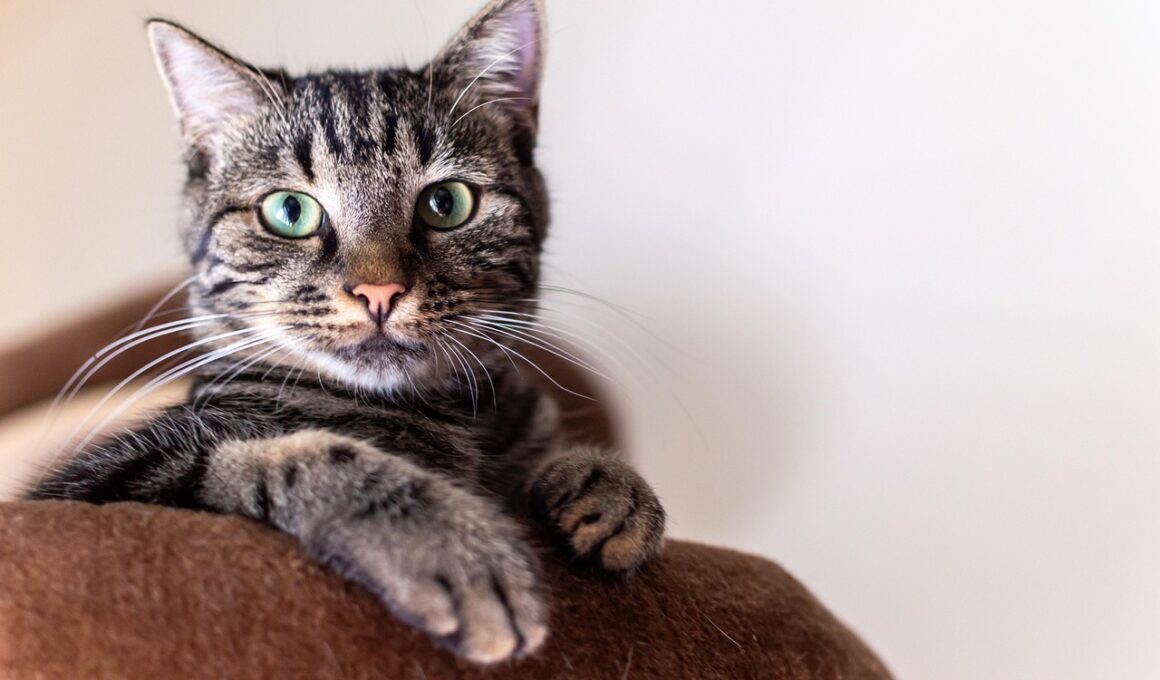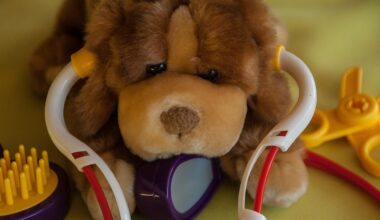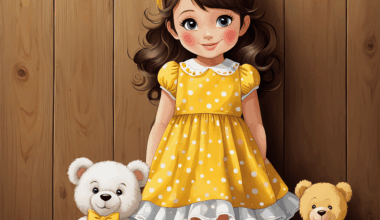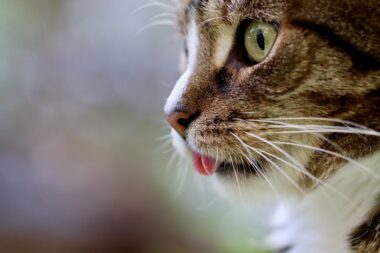Choosing the Right Digestive Health Supplements for Senior Cats
When caring for senior cats, understanding their unique nutritional needs is essential. As cats age, their digestive systems may face challenges, leading to issues like constipation or vomiting. This is where digestive health supplements come into play. These supplements are designed specifically to support an older cat’s gut health. Regularly consulting with a veterinarian can help identify the specific supplements that can benefit your cat. Ingredients like prebiotics and probiotics are common in these products. Prebiotics support the growth of beneficial bacteria, while probiotics introduce healthy strains into the gut. Also, look for supplements containing dietary fibers, helping with digestion and preventing constipation. Good fiber sources include psyllium and pumpkin. Additionally, some supplements may have enzymes to aid digestion. Always choose high-quality products from reputable brands. Be cautious about the ingredients, and ensure they are safe for felines. Many supplements come in chewable or powder forms, making administration easy. They can be mixed with food, ensuring proper intake. Consistent use of effective digestive health supplements can significantly enhance your senior cat’s overall quality of life.
To further support your senior cat’s gut health, it’s essential to consider their diet and lifestyle. Diet plays a vital role in promoting digestive health in older felines. Look for well-balanced cat foods that contain high-quality protein sources, essential fatty acids, and vitamins. These nutrients can help improve digestion, overall vitality, and energy levels. Increase water intake as well. Dehydration can exacerbate digestive issues, so ensure fresh water is always accessible. Some cat owners find that switching to wet food can encourage hydration, as it often contains more moisture than dry food. Additionally, encourage regular exercise by engaging your cat in interactive play. Physical activity improves overall wellbeing and can stimulate appetite and digestion. Also, monitor your senior cat for any signs of digestive distress, such as changes in appetite, behavior, or litter box habits. Early detection can lead to timely intervention, ensuring your pet remains comfortable and healthy. Furthermore, consistency in feeding times can help regulate digestion. Establish a routine that provides meals at the same time daily, contributing to stability and health in your senior cat.
Common Digestive Health Issues in Senior Cats
Senior cats can face various digestive health issues that require careful attention. One major concern is constipation, which frequently arises in aging cats. Certain factors contribute to constipation, including reduced fiber intake, dehydration, and decreased activity levels. Signs of constipation may include infrequent litter box visits or discomfort when trying to defecate. Diarrhea is another common issue that can stem from dietary changes, infections, or sensitive stomachs. Persistent diarrhea can lead to dehydration, so immediate veterinary consultation is crucial. Additionally, many senior cats may develop food intolerances or allergies, manifesting as gastrointestinal upset. Symptoms to watch for include vomiting, bloating, and changes in stool consistency. Regular veterinary check-ups can help identify these issues, leading to adjustments in diet or supplements as needed. A balanced approach involves a combination of appropriate foods and digestive health supplements tailored to your cat’s specific health needs. Timely intervention and consistent care can help manage and improve these common digestive health problems in senior cats, ensuring they lead happy, healthy lives.
Choosing the right digestive health supplement for your senior cat involves research and discussion with your veterinarian. There are numerous options available, each formulated to address specific digestive issues or enhance overall gut health. Look for products that contain both prebiotics and probiotics to support beneficial bacteria in the gut. These live bacteria can help maintain a balanced digestive system. Additionally, some supplements incorporate digestive enzymes, which can assist in breaking down food more effectively, enhancing nutrient absorption. Research the available brands and check reviews to ensure product effectiveness. Always seek veterinary recommendations tailored to your cat’s individual needs. Each cat’s digestive system is unique, so what works for one may not work for another. Therefore, observe how your cat responds to any new supplement. Are there noticeable improvements in digestion or stool quality? Pay attention to your feline’s overall mood and energy levels as well; positive changes in these areas may indicate the supplement is beneficial. The right choice can lead to happier digestive health for your senior cat, contributing to a longer, healthier life.
Signs Your Cat Needs Digestive Health Supplements
Recognizing when your senior cat may need digestive health supplements can be pivotal in maintaining their wellbeing. Some common signs indicating potential digestive issues include frequent vomiting, diarrhea, or irregular stool consistency. If you observe these signs, it may be essential to consult your veterinarian promptly. Additionally, changes in appetite, lethargy, or weight loss can all point to gastrointestinal distress. Home monitoring of litter box habits can provide critical insight into your cat’s digestive health. If there are noticeable changes in frequency or difficulty in passing stool, consider discussing supplements with your vet. Furthermore, bad breath can be another indicator that your cat’s gut health requires attention. Intestinal imbalances can lead to systemic complications that manifest through oral health. Senior cats are often more susceptible to these imbalances, so proactive measures are essential. Regular veterinary check-ups become even more crucial as they offer opportunities to assess changes and potential issues. If you notice any concerning symptoms, do not delay in seeking professional advice to ensure your cat remains comfortable and content.
Incorporating digestive health supplements into your senior cat’s routine should be done gradually to allow for adjustments. Start by introducing small amounts alongside their regular diet, monitoring their reactions to the products. Most cat supplements are well-tolerated, but some pets may initially have mild digestive upsets as their systems adapt. It is wise to consult your veterinarian before making any significant dietary changes or introducing new supplements. They can recommend the best products and proper dosages tailored to your pet’s weight and health condition. Once your cat is accustomed to the new supplement, continue observing their behavior and digestion regularly. Improved stool consistency, reduced digestive complaints, and enhanced energy levels are great signs that your cat is benefiting from the supplements. If any negative reactions occur, discontinue use and contact your veterinarian for guidance. Being attentive to your senior cat’s needs will allow you to make informed choices regarding their care. By investing in their health and wellbeing, you can ensure they enjoy their golden years free from discomfort or digestive problems.
Conclusion: Promoting Senior Cat Digestive Health
Promoting digestive health in senior cats. By understanding their unique needs, you can take proactive measures to ensure your feline companion enjoys optimal gut health. Digestive health supplements play a role in this, specifically addressing age-related digestive issues and promoting overall well-being. A combination of appropriate dietary choices, hydration, and exercise will contribute significantly to your cat’s health. Regular veterinary visits are necessary to monitor and address any emerging health concerns effectively. An educated approach to nutrition and supplementation lays the foundation for a longer, healthier life for your senior cat. Stay vigilant about observing changes in their behavior, appetite, and litter box habits, as these can indicate digestive distress and require timely intervention. Remember that each senior cat’s needs are distinct, making individualized care essential. By being proactive in providing digestive health support and making necessary adjustments, you can greatly enhance your pet’s quality of life. Invest time in selecting quality products, be consistent in their administration, and regularly engage with your veterinarian. Your attentiveness to your senior cat’s needs will yield rewards in the long run.





